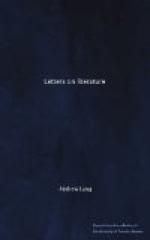How many other poems of Longfellow’s there are that remind us of youth, and of those kind, vanished faces which were around us when we read “The Reaper and the Flowers”! I read again, and, as the poet says,
“Then the forms of the departed
Enter at the open
door,
The beloved, the true-hearted
Come to visit
me once more.”
Compare that simple strain, you lover of Theophile Gautier, with Theo’s own “Chateau de Souvenir” in “Emaux et Camees,” and confess the truth, which poet brings the break into the reader’s voice? It is not the dainty, accomplished Frenchman, the jeweller in words; it is the simpler speaker of our English tongue who stirs you as a ballad moves you. I find one comes back to Longfellow, and to one’s old self of the old years. I don’t know a poem “of the affections,” as Sir Barnes Newcome would have called it, that I like better than Thackeray’s “Cane-bottomed Chair.” Well, “The Fire of Driftwood” and this other of Longfellow’s with its absolute lack of pretence, its artful avoidance of art, is not less tender and true.
“And she sits and gazes at
me
With those deep
and tender eyes,
Like the stars, so still and saintlike,
Looking downward
from the skies.”
It is from the skies that they look down, those eyes which once read the “Voices of the Night” from the same book with us, how long ago! So long ago that one was half-frightened by the legend of the “Beleaguered City.” I know the ballad brought the scene to me so vividly that I expected, any frosty night, to see how
“The white pavilions rose
and fell
On the alarmed
air;”
and it was down the valley of Ettrick, beneath the dark “Three Brethren’s Cairn,” that I half-hoped to watch when “the troubled army fled”—fled with battered banners of mist drifting through the pines, down to the Tweed and the sea. The “Skeleton in Armour” comes out once more as terrific as ever, and the “Wreck of the Hesperus” touches one in the old, simple way after so many, many days of verse-reading and even verse-writing.
In brief, Longfellow’s qualities are so mixed with what the reader brings, with so many kindliest associations of memory, that one cannot easily criticize him in cold blood. Even in spite of this friendliness and affection which Longfellow wins, I can see, of course, that he does moralize too much. The first part of his lyrics is always the best; the part where he is dealing directly with his subject. Then comes the “practical application” as preachers say, and I feel now that it is sometimes uncalled for, disenchanting, and even manufactured.
Look at his “Endymion.” It is the earlier verses that win you:
“And silver white the river
gleams
As if Diana in her dreams
Had dropt her
silver bow
Upon the meadows
low.”
That is as good as Ronsard, and very like him in manner and matter. But the moral and consolatory application is too long—too much dwelt on:




